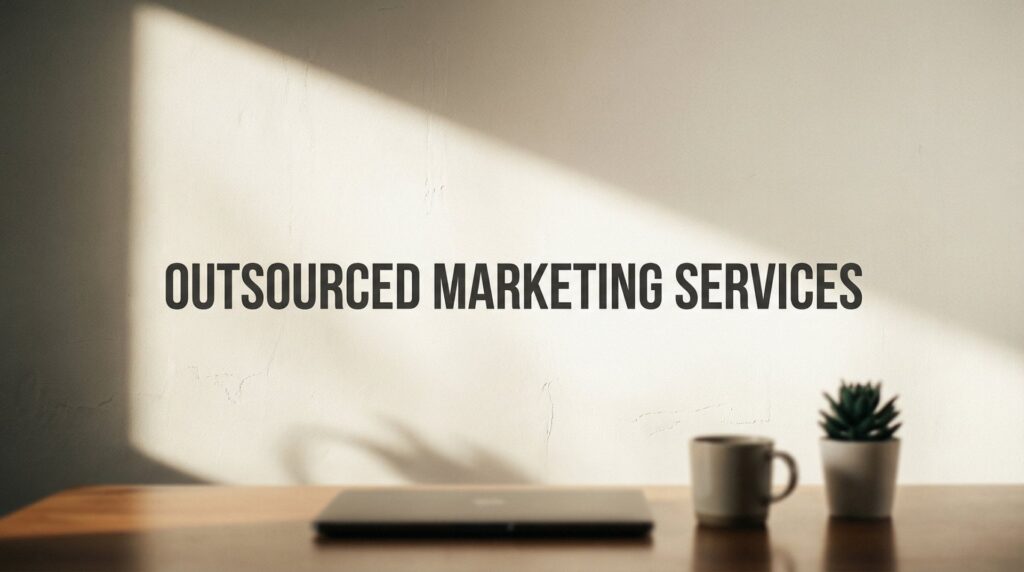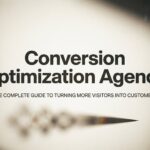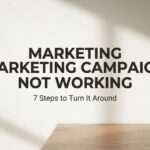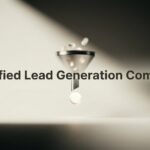When a homeowner's basement floods at 2 AM, they don't look through a phone book. They grab their phone and search for someone who can help right now. This is why a strong water damage restoration SEO strategy is your most powerful tool. It’s what gets you that desperate phone call instead of your competitor.
In Short: SEO makes your business the first and best answer when a local homeowner has an emergency.
Why SEO is Critical for Your Restoration Business
SEO isn't just a marketing buzzword. It's about being visible when a potential customer is in panic mode. For a restoration company, this means owning the top spots on Google for searches like "emergency water removal near me."
If you’re not on the first page, you're practically invisible.
A high ranking on Google does more than get you seen; it builds instant trust. To a stressed homeowner, your business at the top means you're a legitimate, reliable expert ready to solve their problem. It’s far more effective than a billboard because you're offering a lifeline to someone with an urgent need.
From Panic to Profit
In an emergency, the path from a Google search to a phone call is incredibly fast. This is why ranking high is so crucial.
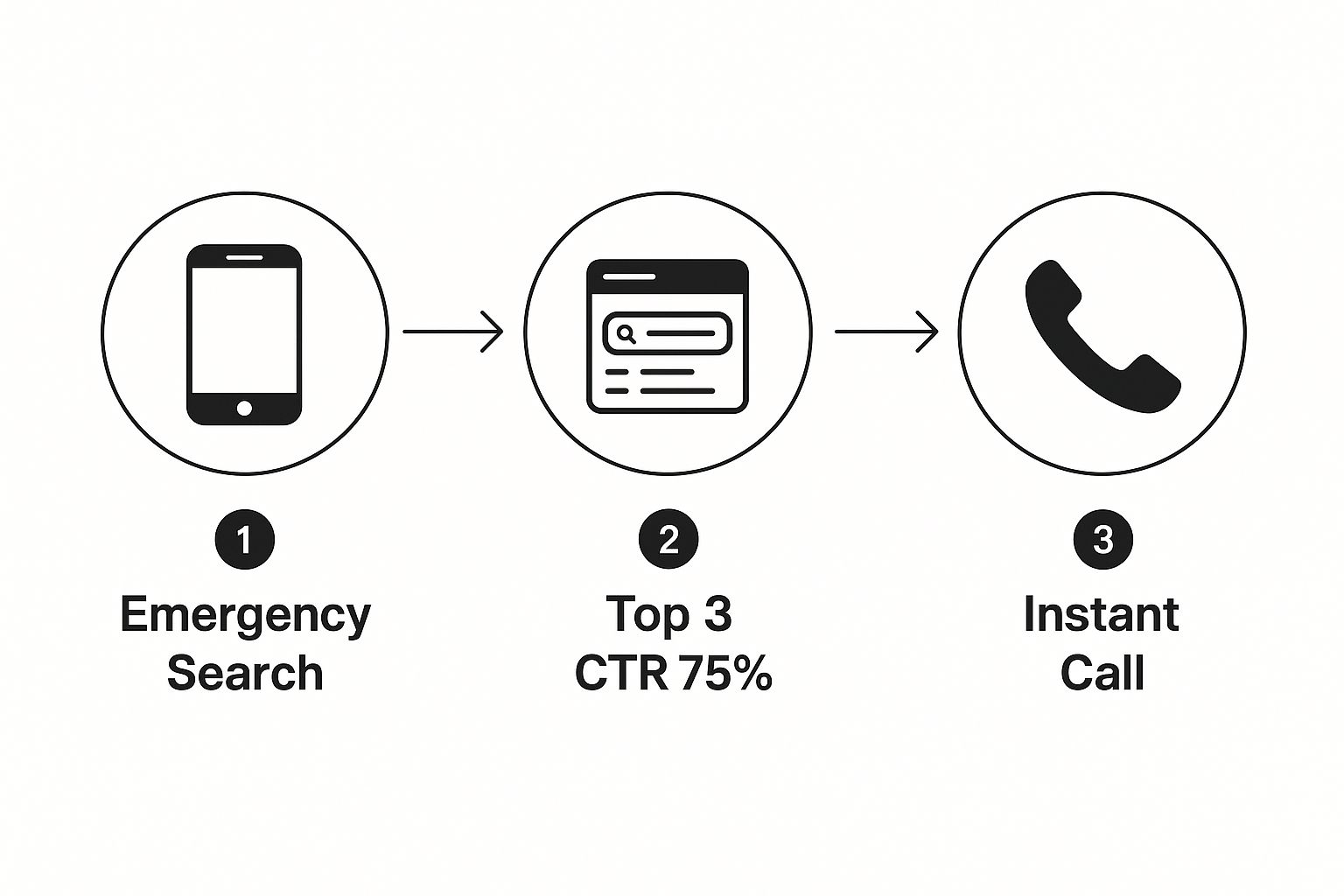
The takeaway is simple: almost all calls go to the top few companies in search results. If you're not one of them, you're missing out on the most valuable, high-intent leads.
A Growing Market Means More Competition
The demand for restoration services is rising. With more extreme weather events, the need for what you do is growing.
For example, between 2019 and 2023, the U.S. averaged about 20 billion-dollar disasters per year. That’s a huge number of floods and storms that leave homeowners searching for pros like you. As this continues, a dominant online presence is a necessity.
🔑 The bottom line: Good SEO puts your business directly in front of people in an emergency, turning their crisis into your next job.
Ultimately, SEO is a core part of a smart business strategy. A solid plan brings in a steady flow of quality leads without you having to constantly pay for ads. To see how this fits into the bigger picture, check out our guide on building a complete water damage contractors marketing plan.
Understanding What Frantic Homeowners Search For
To get found online, you have to think like a panicking homeowner. Forget industry jargon like "mitigation" or "remediation." When someone's basement is turning into a pool, they don't use technical terms.
Their searches are short, desperate, and almost always local. They are typing things like “emergency water removal near me” or “24 hour flood cleanup.” These are high-intent keywords, and they are the goldmine for your business.
Finding Your Goldmine Keywords
Good keyword research is about figuring out the why behind a search. Does someone need a pro with equipment at their house now? Your SEO strategy needs to target these urgent queries.
Here are the main types of keywords:
- Emergency Keywords: These are your money-makers. Phrases like “burst pipe repair,” “flooded basement cleanup,” and “sewage backup help” show urgency. These must be the focus for your service pages and any Google Ads campaigns.
- Informational Keywords: These searches come from people with a problem that isn't a full-blown panic yet. Think "what to do when washing machine leaks" or "signs of mold after water damage." These are perfect topics for blog posts to show your expertise.
- Branded Keywords: This is when someone searches for your company by name. It’s great, but the real goal is to capture homeowners who have never heard of you.
Tools like the Google Keyword Planner are perfect for finding these phrases. It shows you what people in your area are searching for, how often, and how hard it will be to rank for those terms.
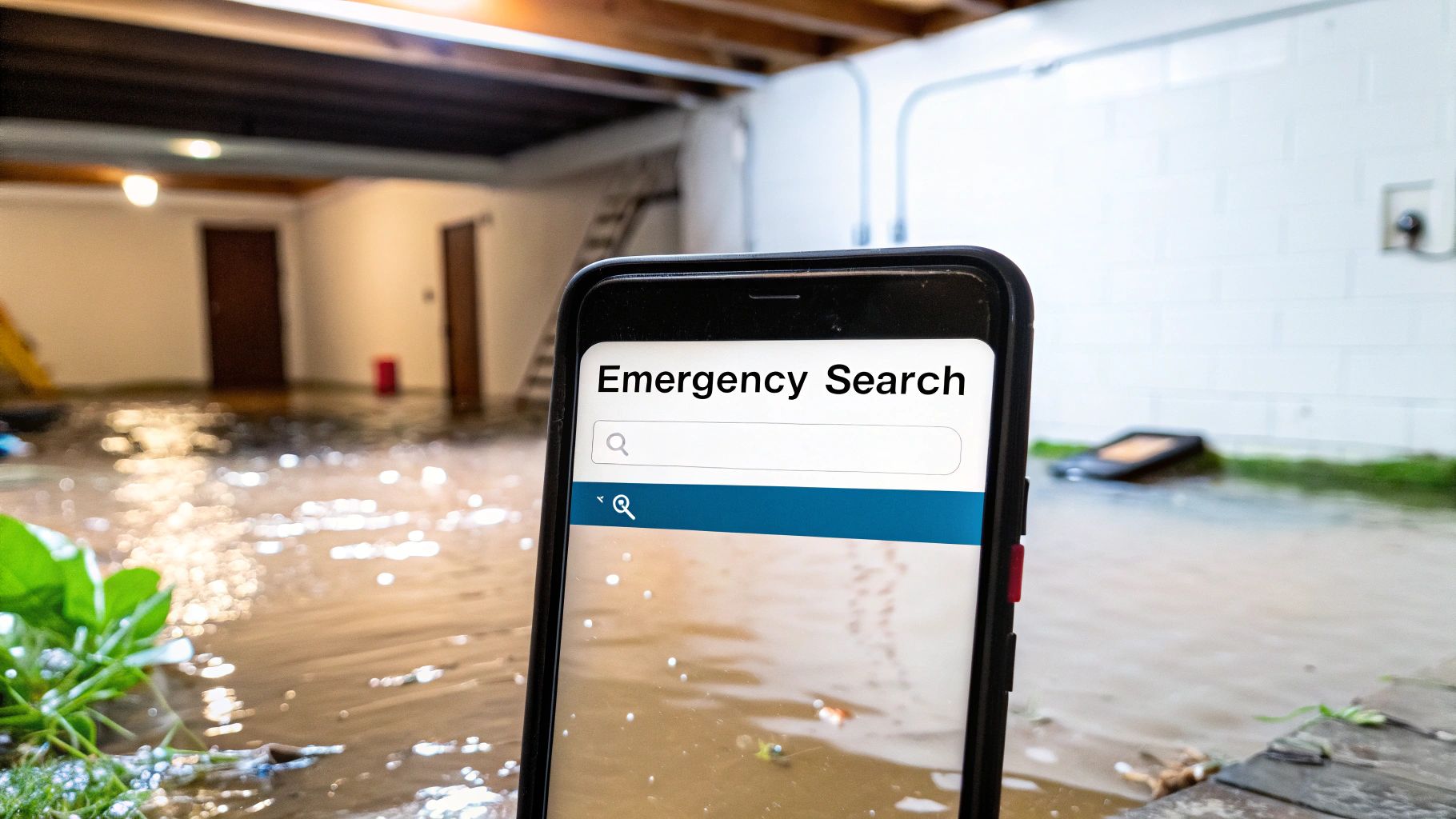
Using a tool like this takes the guesswork out of your strategy. You use real data to aim your efforts where they'll have the biggest impact.
Mapping Keywords to Homeowner Urgency
Not every keyword has the same value. The trick is matching the search term to the right content on your website. This table shows you how to turn panicked searches into jobs.
| Keyword Type | Example Keyword | User Mindset | Your Best Content |
|---|---|---|---|
| Emergency Intent | "24/7 flood cleanup chicago" | "I need help now." | A dedicated Service Page |
| Problem-Solving Intent | "cost to repair water damage" | "How bad is this? What's next?" | A detailed Blog Post or FAQ Page |
| DIY Research Intent | "how to dry wet carpet fast" | "Maybe I can fix this myself." | A How-To Guide or Blog Post |
| Local Service Intent | "water damage companies near me" | "Who are the best pros in my area?" | Your Local SEO-optimized Homepage |
By aligning your content this way, you give people exactly what they need, right when they need it.
People Also Ask About Restoration Keywords
The "People Also Ask" box on Google is a goldmine. It's a direct window into your customers' exact questions.
What are the best keywords for water damage?
The best keywords combine a service, an urgent word, and a location. For example, "emergency flood cleanup Austin" is much better than a generic term like "water damage services." Always think specific, urgent, and local.
How do I find local SEO keywords?
Start with a core service like "water damage repair" and add local terms. Use your city, nearby towns, and well-known neighborhoods. Don't forget phrases like "near me," as Google knows the searcher's location.
What is the difference between commercial and informational keywords?
It's all about intent. Commercial keywords show someone is ready to hire (e.g., "hire water damage company"). Informational keywords show they're learning (e.g., "how to dry wet carpet"). Target commercial terms on service pages and informational ones on your blog.
Becoming the Go-To Local Authority
When a pipe bursts, people aren't searching for a company 50 miles away. They need local help, and they need it now. This is why mastering local search is the cornerstone of your water damage restoration SEO strategy.
The goal is to dominate Google’s Map Pack—that box with a map and three business listings. Getting into one of those spots is like having a billboard on the busiest digital highway in town. It all starts with a great Google Business Profile (GBP).
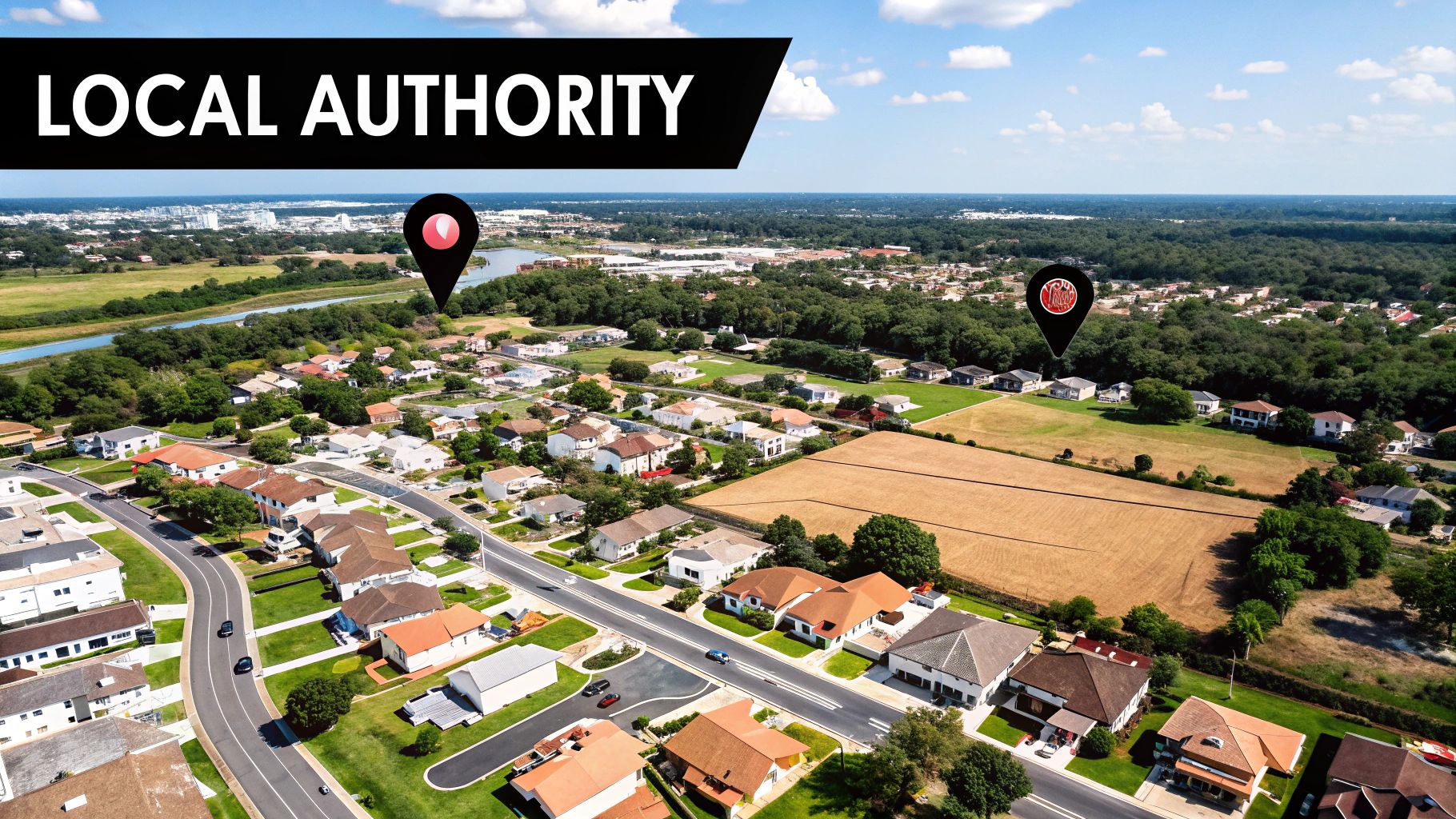
Nail Your Google Business Profile
Think of your GBP as your digital storefront. It's often the first impression a panicked homeowner has of you. Don't just fill it out; optimize it for emergencies.
- Be Specific with Categories: Don't just list "Restoration Contractor." Choose "Water Damage Restoration Service" as your primary category. Add secondary ones like "Fire Damage Restoration Service" and "Mold Remediation."
- Show, Don't Just Tell: Use your GBP Photos section as a portfolio. Upload high-quality, real photos from job sites (with permission). Before-and-after shots are pure gold. They build trust instantly.
- Use the Q&A Feature Proactively: Don't wait for questions. Add your own, like "Do you work directly with insurance companies?" or "What's your emergency response time?" Then, post clear answers.
In Short: An incomplete Google Business Profile is a huge mistake. Update it constantly with new photos and posts to signal to Google that you're active and ready for business.
The Power of Consistent NAP
Imagine giving three people slightly different addresses for your office. It would be chaos. That's what inconsistent business information does to Google.
NAP stands for Name, Address, and Phone Number. It's critical that this information is identical everywhere it appears online.
This includes:
- Your website’s footer
- Your Google Business Profile
- Directories like Yelp, Angi, and Thumbtack
- All your social media profiles
Even a tiny difference, like "St." versus "Street," can confuse Google and weaken your local authority.
Why Local Citations Still Matter
Citations are just mentions of your business's NAP on other websites. Think of them as digital references. The more high-quality, relevant directories you're listed in, the more Google trusts you. This is a fundamental pillar of local SEO, as explained in this guide on local maps SEO.
Dominate Every Neighborhood You Serve
Stop creating a single, generic "Service Areas" page. Instead, build individual location pages for the key towns and neighborhoods you serve.
For example, if your shop is in Dallas but you work in Plano, you need a dedicated page for Plano. Each page should have unique content about your services in that specific area. This strategy proves to Google you have a real presence there.
People Also Ask About Local SEO
How do I get my business on the Google 3-pack?
Getting into the "Map Pack" comes down to three things: relevance (how well your GBP matches the search), distance (how close you are to the searcher), and prominence (how well-known you are, based on reviews and citations). An optimized GBP is your ticket to the game.
What is the most important factor in local SEO?
Your Google Business Profile is the most important factor. It's the central hub for your local presence. A very close second is the consistency of your Name, Address, and Phone number (NAP) across the web.
How can I improve my local SEO ranking?
Start by actively getting more positive reviews on your GBP. Next, audit your NAP to ensure it's 100% consistent everywhere. Finally, build out local landing pages for each service area to show Google you’re the go-to expert in those communities.
Crafting Web Pages That Convert Panic Into Calls
Getting a homeowner to click on your website is a huge win, but it's only half the battle. Your website has just a few seconds to build trust and convince them to call. This is where solid on-page SEO makes all the difference.
On-page SEO means setting up your pages to instantly answer a visitor's most urgent questions. They need to know you’re available 24/7, that you handle their exact problem, and that you can get there fast. If that info isn't obvious, they’ll hit the "back" button.
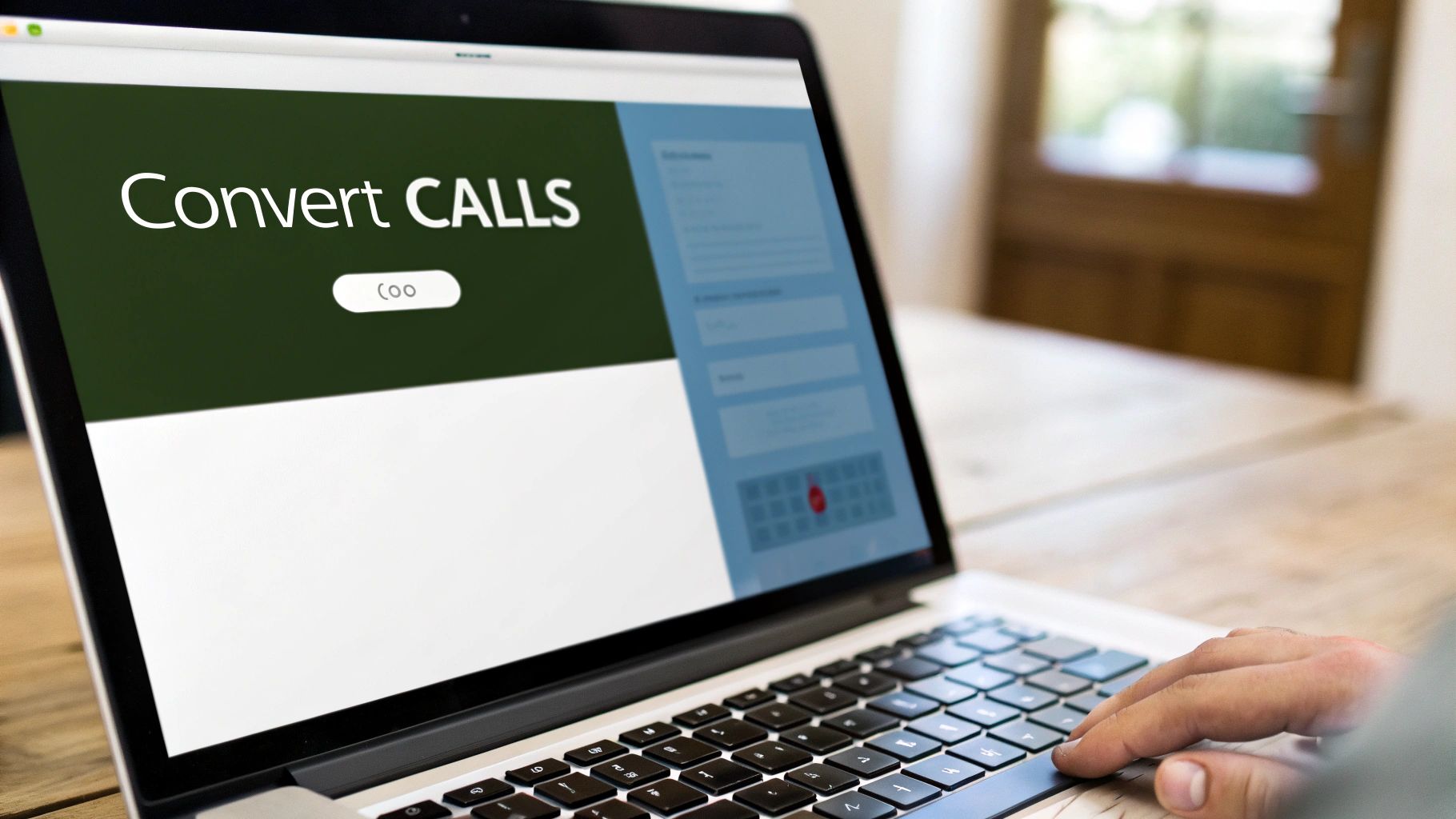
Building Your Core Service Pages
Think of your service pages as your digital sales team. A generic page for "Water Damage Repair" won't cut it. You need dedicated pages for each major service you offer:
- Emergency Flood Cleanup: This page should scream urgency. A "24/7 Emergency Service" headline and your phone number everywhere are non-negotiable.
- Basement Water Removal: Get specific. Talk about sump pump failures and foundation leaks.
- Sewage Backup Cleanup: Highlight your safety protocols and certifications to build immediate trust.
- Mold Remediation: Explain your process for safely finding and removing mold.
Each page needs a clear call-to-action (CTA) like "Call Now For Immediate Help." To make these pages work, follow current SEO optimization best practices.
The Anatomy of a High-Converting Page
Every service page must feel like the perfect answer to a frantic search. It must clearly answer these questions in seconds:
- Do you handle my specific emergency? (Burst pipes, appliance leaks, etc.)
- Are you available right now? (Highlight 24/7 service!)
- Do you work with my insurance? (A simple "We Work With All Insurance Companies" is a massive relief.)
- Are you a real, local company? (Show photos of your team and trucks.)
Most emergency searches happen on a phone, so your mobile site must be flawless. For a great example of how to structure pages for action, check out this guide on how to build a mobile landing page.
🔑 Key Takeaway: Your website's job is to lower a visitor's stress. Make your phone number impossible to miss and answer their biggest questions instantly.
Don't Sweat the Technical SEO Details
A few technical details make a big difference in how Google sees your site. These are simple tweaks that pack a punch.
- Title Tags: This is the big blue link people see in search results. It must get the click. Include the keyword, your city, and your brand name. Example:
"Emergency Water Damage Restoration in Phoenix | Your Company Name" - Meta Descriptions: This is the short paragraph under the title tag. It convinces people to click. Mention your 24/7 service and that you work with insurance.
- Image Alt Text: Google can't see images, so you have to describe them. Instead of
"image123.jpg,"use something like"technician extracting water from flooded carpet in Dallas."
People Also Ask About On-Page SEO
What is the most important on-page SEO factor?
The title tag is arguably the most important. It's a massive signal to Google about your page's content and is the first thing a potential customer sees in search results.
How do I optimize my website for local SEO?
Create city-specific service pages. Embed a Google Map showing your service area. Scatter local testimonials throughout your site to build hometown trust and relevance.
How often should I update my website content?
Your main service pages can stay mostly the same. Show Google your site is active by regularly adding new project photos to a gallery, posting fresh customer testimonials, and writing helpful blog posts.
Building a Network of Digital Referrals
"Backlinks" can sound technical, but for a local business, it's simple. Think of them as digital word-of-mouth.
A good backlink is a link from another reputable local website pointing to yours. Google sees each one as a vote of confidence. This is a huge piece of the water damage restoration SEO puzzle. Your goal isn't hundreds of useless links; it’s a handful of powerful, relevant links from other local businesses.
How to Get Links You’re Actually Proud Of
Forget shady tactics. We're focused on genuine community engagement that naturally turns into digital referrals.
Here are some real-world plays you can run now:
- Sponsor a Local Team: Almost every youth sports team has a website with a "Sponsors" page. Sponsoring a team often gets you a spot on that page with a link to your site.
- Team Up with Other Trades: Who gets the first call when a pipe explodes? A plumber. Build relationships with the best plumbers, roofers, and HVAC companies. Offer a referral fee and ask if they can add you to a "Trusted Partners" page on their website.
- Join the Chamber of Commerce: Your membership almost always includes a listing in their online directory. That link tells Google you’re a serious, legitimate local business.
Create Something People Actually Want to Share
One of the best ways to earn links is to create a resource so helpful that others want to share it.
For example, you could create the ultimate "Hurricane Preparedness Checklist" for your city. Make it the go-to guide with local details like evacuation routes and power company contacts.
Once it's live, share it with:
- Local news stations
- Community Facebook groups
- City-focused bloggers
- Insurance and real estate agents
These people are always looking for valuable, non-salesy content for their audience.
In Short: The best link-building strategies feel like good, old-fashioned community marketing. Be a valuable part of your local ecosystem, and digital referrals will follow.
Look Beyond Google
While Google is your main focus, don't put all your eggs in one basket. Exploring other platforms can diversify your reach. For instance, understanding Pinterest's unique SEO strategies can open up new ways to connect with customers.
People Also Ask About Link Building
How do I get backlinks for my local business?
Start with who you already know. Think about your suppliers or any local charities you support. Reach out and ask if they have a partners page where they could list you. The easiest links often come from relationships you've already built.
What is a good backlink for SEO?
A good backlink is relevant and authoritative. A link from a local plumber’s blog is relevant. A link from the Chamber of Commerce is authoritative. A link from a random marketing blog is neither. Always choose quality over quantity.
How many backlinks do I need to rank?
There is no magic number. It's about quality, not quantity. Your goal isn't to get more links than your competition—it's to get better links. A few strong, local links are worth a hundred weak ones.
Answering Your Top SEO Questions
Let's get right into the questions I hear all the time from restoration business owners. The core ideas of SEO are pretty simple. I want to give you straight, no-fluff answers to help you get moving.
We'll cover budgets, timelines, and what you can do yourself. This is the practical info you need to build your water damage restoration SEO plan.
What’s a Realistic SEO Budget for a Restoration Company?
The honest answer is: it depends. The cost comes down to your service area and how much competition there is.
For a small to mid-sized business in a competitive city, a good starting point is usually between $1,500 to $5,000 per month.
That investment typically covers:
- Local SEO & GBP Management: Keeping your Google Business Profile optimized and active.
- On-Page SEO: Work done directly on your website to improve content and fix technical issues.
- Content Creation: Writing blog posts or building new pages for the towns you service.
- Link Building: Earning "digital handshakes" or backlinks from other reputable local websites.
Think of SEO as an investment. Unlike ads, where leads stop when you stop paying, a strong SEO foundation is an asset that pays you back for years.
How Long Until I See Real Results From SEO?
SEO is a marathon, not a sprint. It's about building trust with Google, which doesn't happen overnight.
Here’s a rough timeline of what to expect:
- Months 1-3: This is the foundation-laying phase. We focus on technical fixes, optimizing your GBP, and rolling out core content. You might see some rankings pop up, but don't expect a flood of calls yet.
- Months 4-6: Now you should feel real momentum. Your rankings for key terms should be climbing, bringing in more traffic and more phone calls.
- Months 6 & Beyond: From here, it’s about building on that momentum. A good SEO campaign never stops; it evolves. We keep refining the strategy and cementing your reputation.
🔑 The Bottom Line: SEO is about building a sustainable, long-term asset. The first few months can feel slow, but the compounding returns after the six-month mark make it a powerful way to grow.
Can I Just Do This SEO Stuff Myself?
The best answer is a little bit of both. You can and should handle some basic SEO tasks yourself.
Here are a few things that are perfect to manage in-house:
- Ask for Reviews: Make it a habit to ask every happy customer for a Google review.
- Snap Job Site Photos: Take before-and-after pictures and upload them to your Google Business Profile.
- Post GBP Updates: Share short updates about recent jobs or quick storm-prep tips. It shows Google you’re active.
That said, the more technical parts of SEO are usually best left to a specialized agency. This includes deep keyword research, technical site audits, and building high-quality backlinks. Most owners find a sweet spot by handling daily tasks while outsourcing the heavy lifting.
At Clicks Geek, we build targeted SEO strategies that make the phone ring for restoration companies. If you're ready to own your local market and get a steady stream of profitable jobs, we should talk. See our approach at https://clicksgeek.com.
Want More Leads for Your Business?
Most agencies chase clicks, impressions, and “traffic.” Clicks Geek builds lead systems. We uncover where prospects are dropping off, where your budget is being wasted, and which channels will actually produce ROI for your business, then we build and manage the strategy for you.


